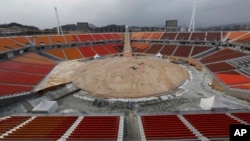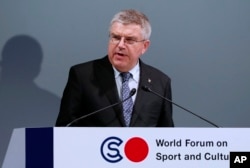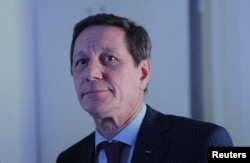The International Olympic Committee banned Russia on Tuesday from competing as a country in the upcoming Winter Games in Pyeongchang, South Korea, but said that individual Russians could compete as an “Olympic Athlete from Russia.”
The long-awaited IOC decision punishing Russia for a state-sponsored doping campaign during the 2014 Olympics in Sochi, Russia, came little more than two months before the quadrennial skiing, skating and sledding contests unfold at venues in the mountains and along the coast of South Korea.
In addition to the 2018 ban for Russia’s representation as a country, the IOC fined the Russian Olympic Committee $15 million and suspended its president, Alexander Zhukov, as an IOC member.
Zhukov told the French news agency AFP he “apologized” to the IOC on Tuesday for the “anti-doping violations” committed in his country in recent years.
'Russian athletes'
He said that the team name would include “Russia” was a key issue. “They’ll be called Russian athletes and not some kind of neutrals ... that’s very important,” he added.
The games will not be broadcast in the country because of the absence of a Russian national team. Russian President Vladimir Putin has previously said that it would be humiliating for his country to compete without national symbols.
Russia could refuse the offer to let its athletes compete without national identity or the playing of the Russian national anthem.
But IOC President Thomas Bach said, “An Olympic boycott has never achieved anything. Secondly, I don’t see any reason for a boycott by the Russian athletes because we allow the clean athletes there to participate.”
However, Pyotr Tolstoy, deputy speaker of the State Duma, the Russian parliament’s lower house, has called for a boycott. “They are humiliating the whole of Russia through the absence of its flag and anthem,” he said in televised remarks.
Alexander Zubkov, president of Russia's Bobsleigh Federation, told Russian TV that the IOC decision was a “humiliation. ... a punch in the stomach.”
Alexei Kravtsov, president of the Russian Skating Union, said: "The decision is offensive, insulting and completely unjustified. ... I consider that this decision will deal a great blow to the whole Olympic movement.”
Stripped of medals
Russia has repeatedly denied it carried out a doping operation. But the IOC has already stripped Russia of 11 medals from the Sochi Olympics and banned more than 20 Russian athletes for life.
Instead, Russia blames Grigory Rodchenkov, the former director of Moscow and Sochi testing laboratories, as a rogue employee.
The scientist is now living under federal protection in the U.S.
His lawyer, Jim Walden, told reporters Tuesday, “Today's decision sends a powerful message that the IOC has joined the world community in saying that Russia's cheating needs to be severely sanctioned.” But, Walden said Rodchenkov remains fearful for his friends and family who are still in Russia.
In addition to the 2018 ban for Russia’s representation as a country, the IOC fined the Russian Olympic Committee $15 million and suspended its president, Alexander Zhukov, as an IOC member.
Nations in the past have been banned from previous Olympics, most notably South Africa during the years it enforced its racially discriminatory apartheid system of government. But no blanket ban of a country has been carried out before because of doping, chemicals athletes have injected to give them an edge against competitors.
Before the ban was announced, Kremlin spokesman Dmitry Peskov told reporters, “We intend to defend the interests of our athletes, of the Russian Federation, to remain committed to the ideals of Olympism and preserve all ties with the IOC, and through these ties the problems that have arisen will be resolved.”






